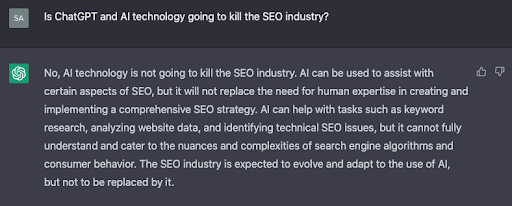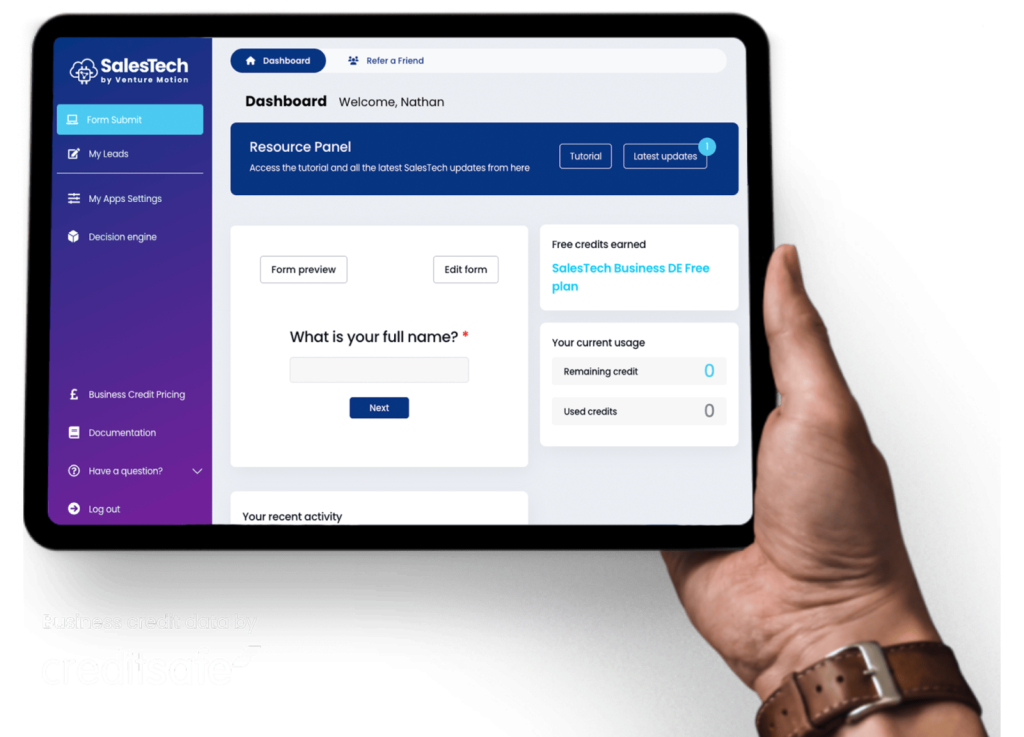AI and the future of SEO: How ChatGPT and Google Bard will disrupt the industry
By now, almost everyone online is aware of the huge uptick in AI technology we’re all experiencing. Whether you’ve seen an out-of-this-world AI-generated artwork from Midjourney, been fooled into believing Prince Harry said something completely outrageous in his autobiography thanks to ElevenLabs or read an eyebrow-raising poem from ChatGPT, AI is here, and it’s here to stay. Nowhere, however, is it more discussed than within the tech space itself.
Is ChatGPT going to kill SEO?
As a technical SEO agency, the question of whether or not ChatGPT – or AI in general – is going to be replacing SEO is a frequently asked one. Many clients could be wondering if new AI technology could totally replace an agency’s years of experience, but would they be right to think that? Well, let’s get an answer straight from the horse’s mouth.

“No, AI technology is not going to kill the SEO industry. AI can be used to assist with certain aspects of SEO, but it will not replace the need for human expertise in creating and implementing a comprehensive SEO strategy. AI can help with tasks such as keyword research, analysing website data, and identifying technical SEO issues, but it cannot fully understand and cater to the nuances and complexities of search engine algorithms and consumer behaviour. The SEO industry is expected to evolve and adapt to the use of AI, but not to be replaced by it.”
There we have it, ChatGPT gives a pretty succinct answer to the query. However, it’s worth expanding on some of the points the AI gives us to help us understand why SEO isn’t going anywhere. For most digital industries, AI technology will be highly disruptive to existing processes, making certain aspects far more simplified than ever before. But that is far more likely to result in better, more efficient output, rather than total replacement.
Our agency founders have gone through dozens of big updates and new technology releases that have been considered everything from minor disruptors to full-on SEO killers. But whenever a new technology is released, we notice that the cycle is the same. Whether it be the switch to mobile-first indexing, the introduction and growth of voice search, or even just a Google update, the reactions follow a pattern:
Step 1:
Both clients and industry experts overreact, insisting that this is the end of SEO as we know it.
Step 2:
The industry begins to make the most of, or adapt to, the new technology.
Step 3:
The SEO industry thrives using the new technology, providing better results for agencies, clients and searchers.
Step 4:
A new technology is released.
Innovative tools like ChatGPT and Google Bard are going to revolutionise the way in which SEO work is conducted for the better. Keyword research will be streamlined, minor tweaks and content optimisation will be done faster and minor hiccups could be made obsolete. This is all good news for both those working in the industry, and clients who are seeking a more efficient service from their SEO providers.

As an example, we’ll be able to analyse website data more efficiently than ever before. That means SEOs will be able to offer a faster service while attaining the same results. However, the AI is highly unlikely to be able to understand and implement the exact changes required that vary due to an innumerable number of factors on a case-by-case basis. The human element of creative problem solving, lateral thinking and ability to constantly change methodology to fit the situation are likely to always be necessary in the industry. On top of that, the kind of unspoken, human element of explaining issues in a way that everyone can understand in a consultancy setting is absolutely essential. It’s never enough to simply state what is wrong, you also need to be able to analyse the behaviour of the client to help them effectively understand why there is an issue, the implications of the issue and how to avoid it in the future.
There are two main areas in which we can focus to explain how AI technology can be incredibly useful, without it being seen as a tool that’s going to irrevocably change SEO. The first is to examine what ChatGPT can’t do that a human SEO expert can. The second is to speculate – which is, unfortunately, all we can do for now – on how the behaviour of a searcher is likely to change with the integration of ChatGPT into Bing and Google Bard into Google search.
What can’t AI do?
Offer variety
Search engines offer great variety in their results pages, allowing searchers to make their own decision when making a query. Humans like to research, assess and compare before reaching a decision – particularly when that decision is a purchase.
While ChatGPT’s technology may be excellent when users are in the research stage, being able to answer questions instantly and with detail, it’s highly unlikely that that use will follow all the way through to the purchasing stage. For example, if you were searching for “What are the best headphones for under £200” would you simply believe the robot? Deciding to buy there and then based on the description it offers you? If you’re anything like me, the answer is an obvious no.
The same fear came about with the rise of voice search and digital assistants such as Alexa, Siri or Cortana in our devices. And while ChatGPT has improved dramatically on their capacity to answer questions, as it stands it’s far more useful for helping people cheat on their homework or reciting a concise biography of Henry VIII than it is for overhauling the way SEO will be conducted on ecommerce sites.
Be creative
Creativity is still the cornerstone of SEO, and is one of the most difficult areas for companies to focus on when they choose not to outsource to a team of experts. Whether writing relatable and engaging content for specific audiences, interacting in the correct way when link-building or being able to think laterally when determining why a site may have lost rankings, traffic or conversions, creativity is essential to the process.
AI is a long way from being able to truly replicate the human experience, and while it may be able to write a conventional formal email or short explanation, the creativity to write in an engaging and human manner is still a long way off. If anything, the rise of AI is more likely to ensure that websites who don’t harness creativity in their SEO campaigns will suffer, making the work of the highly creative lateral thinking people in SEO far more valuable and far more effective.
Monitor trends
AIs work by pulling knowledge from existing data sources. While machine learning will ensure these sources are always updating, the dataset is unlikely to be as quick to understand why something has happened, rather than simply that something has happened.
The SEO industry is ever evolving and moving forward, and there are currently no AI tools available that are able to constantly analyse, understand and act on totally new trends.

How will search behaviour change with the introduction of AI?
We are likely to see some search behaviour change as ChatGPT and Google Bard are rolled out into search engines. Consumers, whether they’re looking to purchase a product, find a recipe or answer a question will always be seeking the most straightforward and streamlined route to their destination.
While AI technology will be more than adept at providing these snappy answers – the kind we already see in rich snippets like FAQs and People Also Ask – when it comes to buying a product or service, the user is still very likely to look deeper. As long as businesses continue to provide interesting, useful and creative content on their websites, they’ll continue to see customers arriving. One could predict that some organic traffic drop off may occur, but with the current state of ChatGPT and Google Bard, this will most likely be for informational searches made by users who would never have converted in the first place.
So what should we do?
This level of AI technology is, for now, nothing more than a very interesting new tool in the arsenal of business owners and professional SEOs. Now that it has been invented, it won’t be going away. For SEOs, businesses and searchers, adaptation in how we all use the internet will no doubt occur, but it’s unlikely that this next big thing will totally wipe out any industry. With more new consumer AI technology hitting the market, it’s up to agencies and SEOs to embrace new tech, harnessing its power to help grow the industry. We’ll be able to offer higher level consultancy solutions, with new AI technologies supporting us.
The kind of AI technology we’re seeing be deployed by Microsoft and Google is still very new and moving at an incredibly rapid pace. As such, we’ll be continually updating this article with new information as and when it comes to life.




